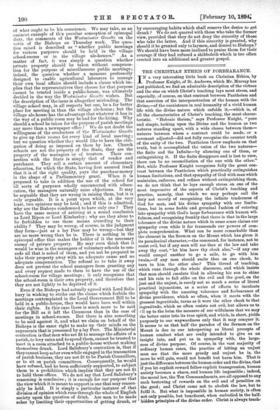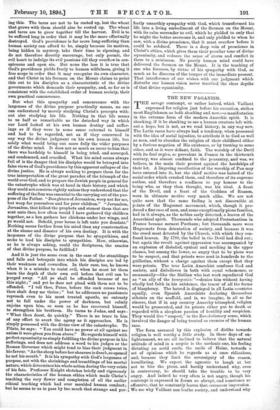THE CHRISTIAN ETHICS OF FORBEARANCE.
IN a very interesting little book on Christian Ethics, by Professor Knight, of St. Andrews, which Mr. Murray has just published, we find an admirable description of the virtues and the sins on which Christ's teaching lays most stress, and especially, of course, on that contrast between Pantheism and that assertion of the interpenetration of the human with the divine,—of the coexistence in red humanity of a vivid human life with the divine nature which enfolds it,—which is, of all the characteristics of Christ's teaching, the most charac- teristic. "Hebraic theism," says Professor Knight, "pure and simple, looking upon the Divine and the human as two natures standing apart, with a wide chasm between them— natures between whom a contract could be made, or a covenant adjusted—did not fully recognise the counter truth of the unity of the two. Pantheism threw emphasis on that truth, but it accomplished the union of the two natures— the finite and the Infinite—by silencing one of them, or extinguishing it. If the finite disappears and is lost to view, there can be no reconciliation of the one with the other." But, while Professor Knight recognises fully the great con- trast between the Pantheism which practically extinguishes human limitations, and that sympathy of God with man which maintains, enforces, and refines without extinguishing them, we do not think that he lays enough stress on one of the most impressive of the aspects of Christ's teaching and practice, namely, that which we may perhaps call the duty not merely of recognising the infinite tenderness of God for man, and his divine sympathy with our limita- tions, but in some feeble and germinal fashion of entering into sympathy with God's large forbearance with human wil- fulness, and recognising frankly that there is that in the large tolerance of the divine nature which in some sense claims our sympathy even while it far transcends our powers of com- plete comprehension. What can be more remarkable than the element in the Sermon on the Mount which has given it its paradoxical character,—the command, for instance, not to resist evil, but if any man will sue thee at the law and take away thy coat, "let him have thy cloak also,"—if any one would compel another to go a mile, to go with him twain,—if any man should smite thee on one cheek, to turn to him the other also? This thread of teaching, which runs through the whole discourse, and which insists that man should emulate God in allowing his sun to shine and his rain to fall alike on the evil and the good, on the just and the unjust, is surely not so much a series of literal practical injunctions, as a series of efforts to inculcate sympathy with the amazing tolerance and forbearance of divine providence, which so often, when it meets with the grossest ingratitude, turns as it were the other cheek to that ingratitude, which so often resists not evil, but allows us to fill up to the brim the measure of our wilfulness that we may the better enter into its true spirit, and which, in short, yields purposely to our waywardness only that it may conquer it. It seems to us that half the paradox of the Sermon on the Mount is due to our interpreting as literal precepts of human conduct what are really intended to give us an insight into, and put us in sympathy with, the large- ness of divine purpose. Of course, in the vast majority of ordinary human cases, the practice of letting an unjust man see that the more greedy and unjust he is, the more he will gain, would not benefit but harm him. That is just the difference between the human order and the divine, that if you let explicit reward follow explicit transgression, human society becomes a chaos, and human life impossible ; indeed, the moral law, the Ten Commandments, are all opposed to any such bestowing of rewards on the evil and of penalties on the good; and Christ came not to abolish the law, but to fulfil it. But what is impossible in human society, is often not only possible, but beneficent, when embodied in the half- hidden principles of the divine order. Christ is always teach-
ing this. The tares are not to be rooted up, lest the wheat that grows with them should also be rooted up. The wheat and tares are to grow together till the harvest. Evil is to be suffered long in order that it may be the more effectually destroyed. God's providence is far more long-suffering than human society can afford to be, simply because its motives, being hidden in mystery, take their time in ripening, and do not therefore directly encourage, but only permit, the evil heart to indulge its evil passions till they overflow in con- spicuous and open sin. But none the less it is true that God's providence yields freely to human wilfulness, giving it free scope in order that it may recognise its own character, and that Christ in his Sermon on the Mount claims to point this out to his disciples as a characteristic of the divine government which demands their sympathy, and, so far as is consistent with the established order of human society, their own practical concurrence.
But what this sympathy and concurrence with the largeness of the divine purpose practically means, no one can understand by merely studying Christ's precepts with- out also studying his life. Nothing in that life seems to us half so remarkable as the detached way in which our Lord looked at his own human destiny and suffer- ings as if they were in some Sense external to himself and had to be regarded, not as if they concerned in any way the divine judgment on his own human life, but solely what would bring out more fully the wider purposes of the divine mind. It does not so much as occur to him that there was hardship to himself in being tried, and scourged, and condemned, and crucified. What his mind seems always full of is the danger that his disciples would be betrayed into false views of God's providence by this apparent collapse of the divine justice. He is always seeking to prepare them for the true interpretation of the great paradox of the triumph of the world over God, and to prepare the Jewish people in general for the catastrophe which was at hand in their history, and which they could not construe rightly unless they understood that the suffering of the Son was essential to the carrying out of the pur- pose of the Father. "Daughters of Jerusalem, weep not for me, but weep for yourselves and for your children." "Jerusalem, Jerusalem, that killest the prophets and stonest them that are sent unto thee, how often would I have gathered thy children together, as a hen gathers her chickens under her wings, and ye would not. Behold, your house is left unto you desolate." Nothing seems further from his mind than any consternation at the shame and disaster of his own destiny. It is with the largeness of the divine purpose that he sympathises, and seeks to lead his disciples to sympathise. How, otherwise, as he is always asking, could the Scriptures, the oracles of that divine purpose, be fulfilled ?
And it is just the same even in the case of the stumblings and falls and betrayals into which his disciples are led by their weakness and cowardice. In their ease, too, he knows when it is a mistake to resist evil, when he must let them learn the depth of their own evil before that evil can be purged away. "All ye shall be offended because of me this night ; " and yet he does not plead with them not to be offended. "I tell thee, Peter, before the cock crows twice, thou shalt deny me thrice ; " but he addresses no passionate reproach even to his most trusted apostle, no entreaty not to fall under the power of darkness, but calmly enjoins upon him, so soon as he has recovered himself, to strengthen his brethren. He turns to Judas, and says : "What thou doest, do quickly." There is no trace in him of any effort to avert the agony as it approaches. He is simply possessed with the divine view of the catastrophe. To Pilate, he says: "You could have no power at all against me unless it were given you from above." He regards himself with perfect equanimity as simply fulfilling the divine purpose in his sufferings, and does not address a word to his judges or the Roman Governor which might tend to bias their judgment in his favour. "As the sheep before her shearers is dumb, so opened he not his mouth." It is his sympathy with God's largeness of purpose, not with the shrinkings and tremblings of his mortal nature, which determines his whole action during the very crisis of his fate. Professor Knight sketches briefly and vigorously the characteristics of the human ethics which made Christ's teaching the very flower and completion of all the earlier ethical teaching which had ever moulded human conduct; but he seems to us to pass by too much that strange and per-
fectly unearthly sympathy with God, which transformed his life into a living embodiment of the Sermon on the Mount, with its calm surrender to evil, which he yielded to only that he might the better overcome it, and only yielded to when he saw, with a divine prescience, that it must overflow before it could be subdued. There is a deep vein of prescience in Christ's ethics, which gives them their peculiar tone of divine equanimity, and reduces the sense of storm and conflict in them to a minimum. No purely human mind could have delivered the Sermon on the Mount. It is the teaching of one who foresees, by virtue of his sympathy with God, as much as he discerns of the temper of the immediate present. That interference of our wishes with our judgment which disturbs our human vision never troubled the clear depths of that divine equanimity.







































 Previous page
Previous page